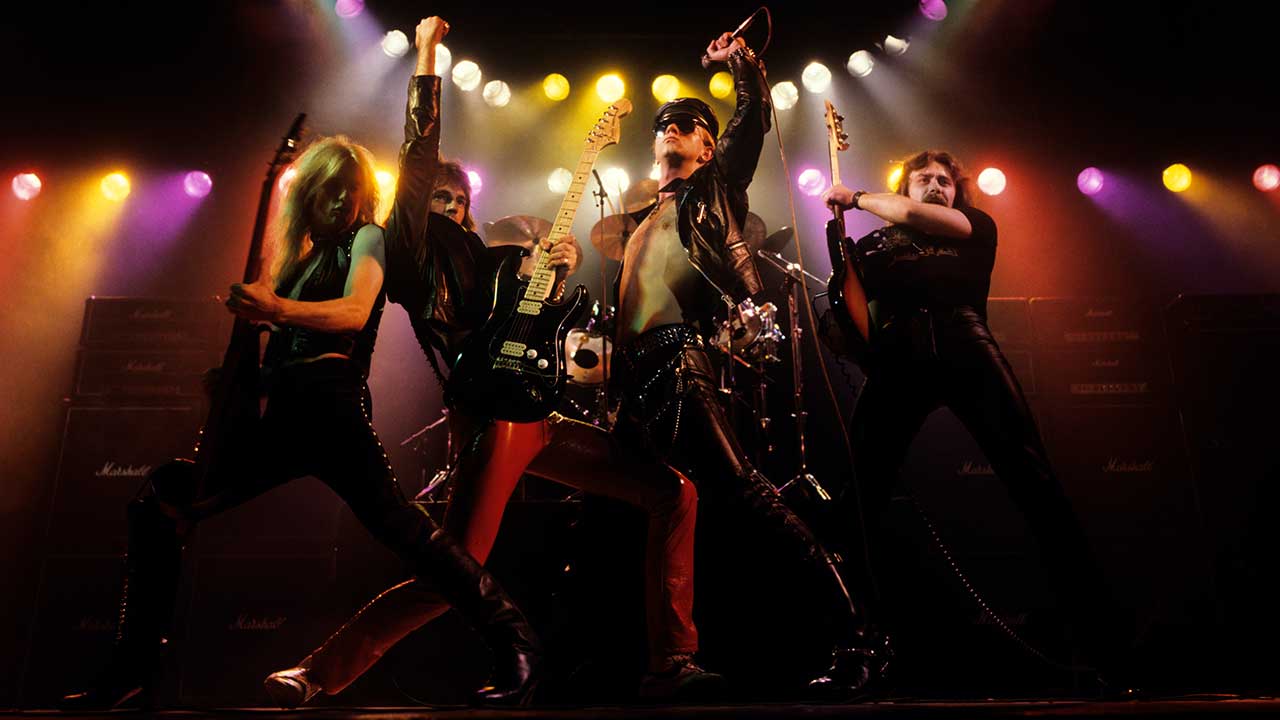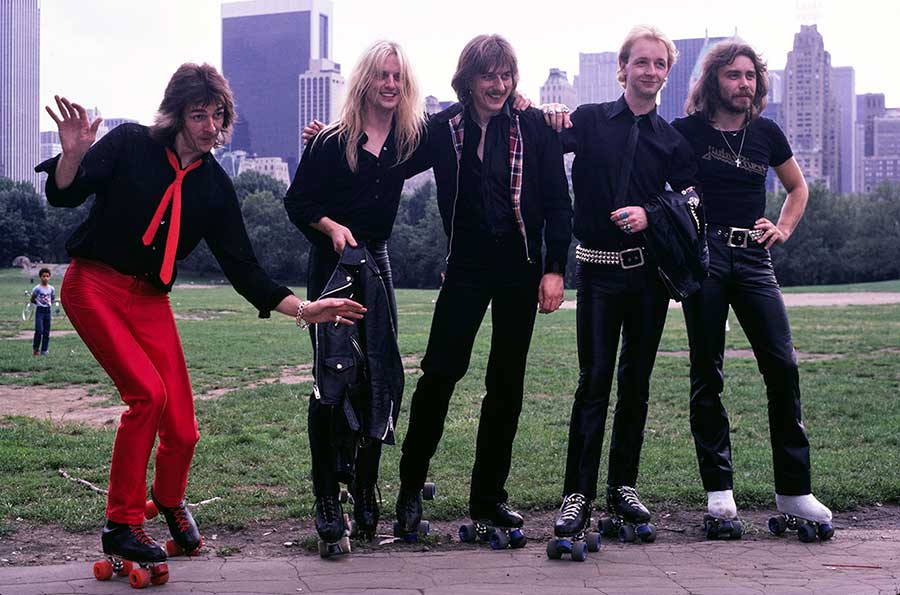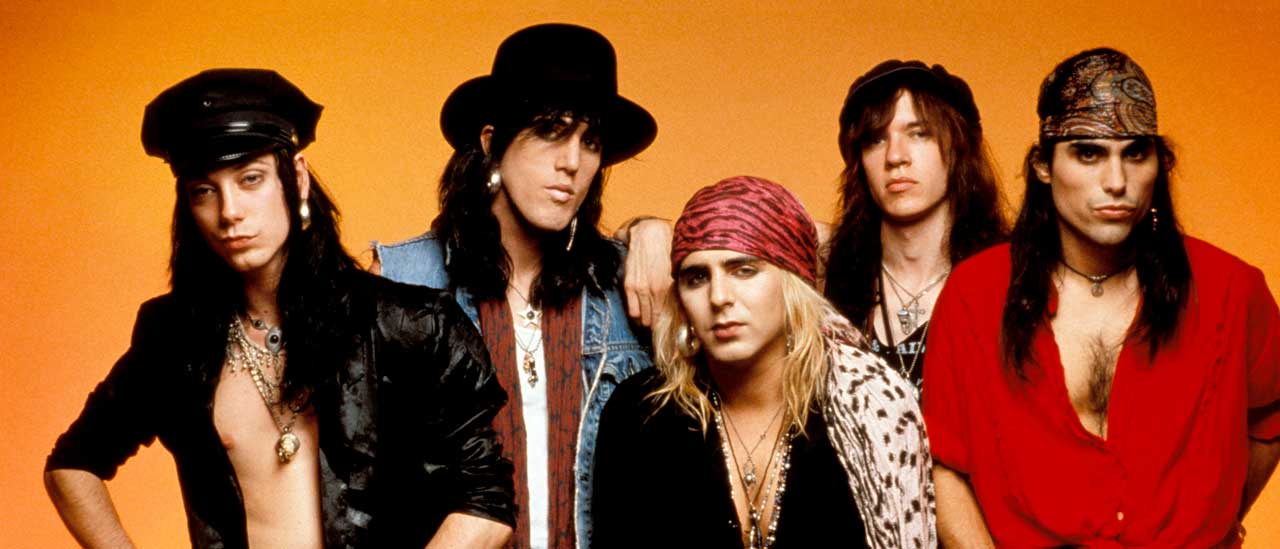Kiss, bingo, and a towel problem: on the road with Judas Priest in 1979
In 1979 Judas Priest were poised for greatness. The band’s live album, Unleashed In The East, had hit No.10 in the UK. Now America beckoned, and Classic Rock's Geoff Barton was there

Select the newsletters you’d like to receive. Then, add your email to sign up.
You are now subscribed
Your newsletter sign-up was successful
Want to add more newsletters?

Every Friday
Louder
Louder’s weekly newsletter is jam-packed with the team’s personal highlights from the last seven days, including features, breaking news, reviews and tons of juicy exclusives from the world of alternative music.

Every Friday
Classic Rock
The Classic Rock newsletter is an essential read for the discerning rock fan. Every week we bring you the news, reviews and the very best features and interviews from our extensive archive. Written by rock fans for rock fans.

Every Friday
Metal Hammer
For the last four decades Metal Hammer has been the world’s greatest metal magazine. Created by metalheads for metalheads, ‘Hammer takes you behind the scenes, closer to the action, and nearer to the bands that you love the most.

Every Friday
Prog
The Prog newsletter brings you the very best of Prog Magazine and our website, every Friday. We'll deliver you the very latest news from the Prog universe, informative features and archive material from Prog’s impressive vault.
The Chicago Amphitheater is a morose old giant of a building situated in the seedier side of town. Judas Priest’s tour bus sidles up to the dark stone venue with caution. Inside the vehicle – as All In The Family, the US version of Till Death Do Us Part, blares from a portable TV – I sit peering through a crack in the curtains, amazed at the change in the appearance of the city, even though we’ve only travelled a few miles.
We started off from the Holiday Inn, a towering edifice occupying a proud position on Chicago’s most exclusive street, Lakeshore Drive, and overlooking Lake Michigan. We continued through the city centre, strewn with skyscrapers – including Sears Tower, then the world’s tallest skyscraper. Finally we ended up in the real Chicago – grey, dusty and uncared for, with weeds growing up through the cracks in the road.
“If the bus breaks down here, we’ve had it,” mutters Priest’s guitarist Glenn Tipton. But when we finally draw to a halt, it's Kiss fans who greet us. Their features covered in make-up. They’re milling around Priest’s bus in the hope that their idols are inside.
The coach door opens and the warpaint-daubed horde looks up in anticipation. The Kiss fanatics catch a glimpse of Priest’s other guitarist, KK Downing, and for a moment they seem about to charge the bus. Then they do a double-take. They realise that no-one in Kiss has long, blond hair.
The crowd draws away – they don’t want any old band – they want Kiss. And they will accept no substitute. But then again neither, it appears, will Kiss. In terms of a substitute support act, that is. Judas Priest have opened up for Kiss throughout the second leg of their American tour and, although Priest are due to finish in November, Kiss are doing their damnedest to persuade Priest to stay on the road with them. Why? Because Kiss’s popularity is on the wane, and Judas Priest are one of the very few hot rock acts in the States.
They’re on the verge of a major breakthrough, and it’s been calculated that they put on an extra two or three thousand on the door of every gig they do as Kiss’s special guests. Kiss, for their part, released their Dynasty album in summer 1979. Controversially, its lead track – I Was Made For Lovin’ You – is a disco anthem produced by Giorgio Moroder, the king of European disco.
It caused uproar among hardcore Kiss aficionados. People magazine recently quoted Gene Simmons as saying that “our accountants reckon that Kiss could retire tomorrow and buy Idaho”. But nevertheless Simmons must find it galling to put an extravagant show out on to the US road and then find that people aren’t exactly flocking to see it. But this is a great opportunity for Priest to reach out not only to today’s rock audience but tomorrow’s as well.
Sign up below to get the latest from Classic Rock, plus exclusive special offers, direct to your inbox!
The number of children who turn up to Kiss gigs with their parents is remarkable; it’s a tribute to Kiss’s far-reaching (if contrived) comic book influence. If Priest can win these fledgling fans over, then they’ll be set up in the US for life.

“From England, please welcome CBS recording artists Judas Priest!” booms from the PA and I find myself in the midst of thousands of crazy, drugged-up American concertgoers. Hell Bent For Leather explodes from the speakers and I barge my way to the front. I’m moved on by security guards but eventually manage to tumble into the photographers’ pit. Thank God for VIP passes.
I look up to see guitarists Tipton and Downing careering about like men possessed. Vocalist Rob Halford looks bug-eyed and demented, as if he’s undergoing electric shock therapy. Green Manalishi (With The Two-Pronged Crown) sees Halford growling the words, ‘Gonna drive me mad!’ and thumping the side of his head with his fist. And during the line, ‘Makin’ me see things I don’t wanna see’ he stabs at his eyes with two fingers. Ouch.
The set’s highlight is Running Wild, from the Killing Machine album (retitled Hell Bent For Leather for the US market), and I can feel the air around me crackling with Priest’s raw, primeval power. The end result, it must be said, is not altogether unpleasant.
Later in the evening, KK Downing relaxes in the Holiday Inn bar, decorated in a ‘tavern’ style that’s supposed to resemble an English pub. It’s part home-from-home, part booze-sodden nightmare.
Downing starts muttering a message into the mic of my cassette recorder: “Here I am, folks, in sunny Chicago sipping on a Pina Colada which, to tell the truth, is made up mainly of ice. Actually the straw that’s come with it is only about a millimetre in diameter, so it’s rather hard to suck. I think I’ll order some more. [Gestures towards waitress.] Excuse me, can I have three more straws? It’s mainly ice…”
Talking about the show, I mention ‘overkill’.
“That’s what it is at the moment, our set,” Downing barks. “Overkill. Totally barragetic. Have you heard that word before? It comes from ‘barrage’.”
Once again, KK speaks into the mic: “Good this, isn’t it, folks? I’ve been drinking Scotch all day [giggles]. I’m well away…
“But to be serious… yes, actually, that’s the way I like to play – fast and furious. If we slowed down I’d probably fall over.”
Contrary to some reports, Downing hasn’t found Kiss to be unfriendly.
“Those guys are multi-millionaires, but before I go out on stage I’ll see Paul Stanley dressed in jeans and a T-shirt, and he’ll say: ‘Have a good gig.’ That means the world to me.
“I mean, we’ve opened for English acts and never even got to see the fucking geezers. One of the nicest people, though, is Eddie Van Halen. He’s terrific, and he even admitted to me that Van Halen used to play Priest’s song Victim Of Changes.”

Returning to the subject of Kiss I get the feeling that the band feel bitter about never having equalled Priest’s US success in the UK.
“That’s right. Every American artist looks to Britain as the heart of the rock world. Kiss got disillusioned after their first British tour [in May 1976], but they should come back for a second time… they’d make it in the end, of that I’m sure.”
Can you really see Kiss returning to the UK?
“I dunno. I mean, those guys require 85 towels per performance. We have 15 and they have 85. Not just because they sweat buckets, but because they’re always throwing towels out into the crowd. But can you imagine the problems in Britain? The promoters will say: ‘85 towels? No chance. Got a few bog rolls though, love…’”
We get around to talking about Priest once again and I mention that I’ve heard that the picture on the cover to the Unleashed In The East album was taken during a set-up session at Dunstable Civic Hall.
“Where did you get that from?” snarls Downing in mock outrage. “Dunstable Civic Hall? A total fallacy.”
Speaking into the mic once more: “Who do you believe, readers? Me, or this Barton fellow?”
Actually, the photographer – Fin Costello – spilled the beans.
“Fin? Never heard of him.”
Fin also told me that while you were up on stage there was a crowd of old age pensioners in the audience.
“Old age pensioners? I’m not sure, actually.”
And they were playing bingo.
“From a professional point of view I deny those accusations. I just don’t know where you get your information from. Fin Costello? When I get to see him I’ll give him a shunt up the arse.
“No, the picture was taken when we were playing in front of one of our favourite audiences in Japan. Good shot, isn’t it? Except for Glenn Tipton. His face looks like a bruised tomato.”
By now it’s the early hours of the morning and the bar is closing. Downing sets down his drink and murmurs into the mic for the last time:
“We have to lift off now, folks, the bar’s just shut in sunny Chicago. Only trouble is, I can’t see much spare. Oops! There’s some. Scored again!"
And KK disappears in hot pursuit.
This feature originally appeared in a Classic Rock Heavy Metal special in 2005.
Geoff Barton is a British journalist who founded the heavy metal magazine Kerrang! and was an editor of Sounds music magazine. He specialised in covering rock music and helped popularise the new wave of British heavy metal (NWOBHM) after using the term for the first time (after editor Alan Lewis coined it) in the May 1979 issue of Sounds.

